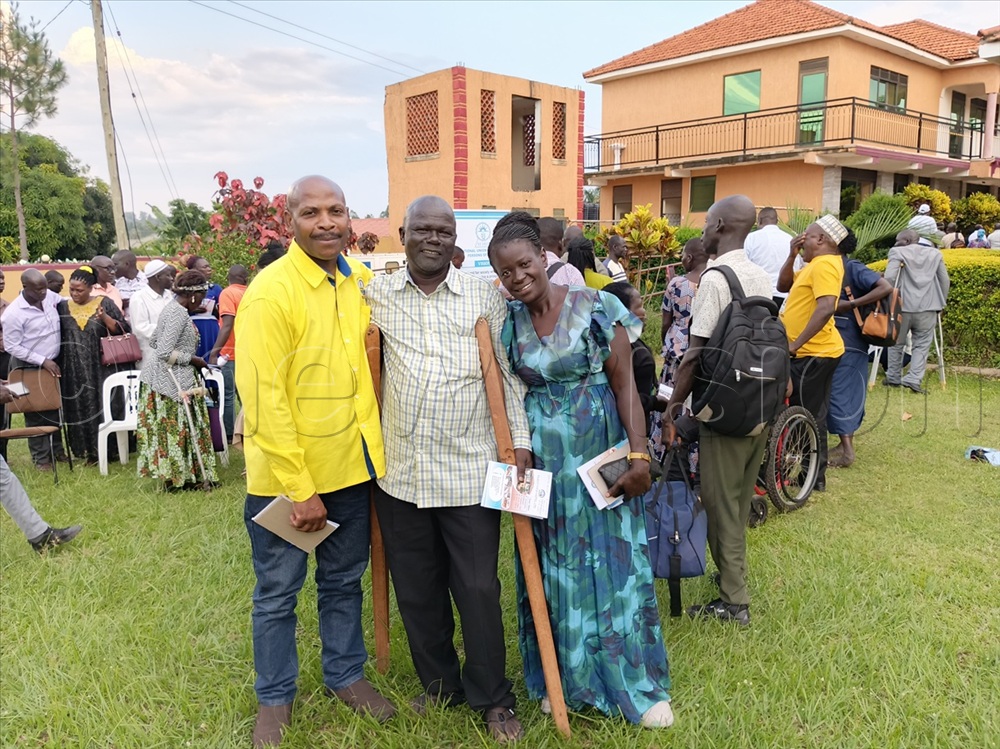Vote for candidates with clear agenda — PWDs body
“We are in a political season, and we want contestants to account for what they plan to do for PWDs in areas such as food security, land rights, health, education and social protection,” Kyozira said.
UDIPU chief executive officer Esther Kyozira addressing some of the PWDs from Northern Uganda on November 17, 2025. (Photos by Rosemary Anena)
________________
The National Union of Disabled Persons of Uganda (NUDIPU) has urged its members to vote for candidates with clear and committed plans aimed at improving the lives of persons with disabilities (PWDs).
The call was made as the union held its first-ever engagement, bringing parliamentary candidates closer to their voters.
Speaking to New Vision Online on November 17, 2025, at Flight View Hotel in Bardege-Layibi division, Gulu city, NUDIPU chief executive officer Esther Kyozira said the workshop aimed at giving contestants a platform to present their manifestos directly to PWD voters.
“We are in a political season, and we want contestants to account for what they plan to do for PWDs in areas such as food security, land rights, health, education and social protection,” Kyozira said.
“Many of our voters cast their ballots without knowing what candidates stand for. This engagement allows both contestants and voters to ask questions and make informed choices.”
Founded in 1987, NUDIPU is the national umbrella organisation that brings together groups and organisations of persons with disabilities across Uganda.
The workshop was organised under the We Are Able project, a five-year initiative implemented by NUDIPU in partnership with ZOA, VNG International, and The Hague Academy in the Acholi and West Nile regions, covering Omoro, Nwoya, Arua City, Yumbe, and Terego districts.
Kyozira urged voters to support only candidates with clear, committed, and realistic plans for PWDs.
“The challenges we face as PWDs are complex and require leaders who are passionate, compassionate, and accessible,” she noted.
Only five candidates attend
Eleven candidates are contesting for the Parliamentary seat for PWDs, including Joyce Acan, Rose Achayo, Alex Ndezz, Mpindi Bumaale, Hellen Asamo, Yona Wasswa, Gabriel Kato, Robert Ssewagudde, Patrick Mulindwa, and Eunice Nyamuhakyi. However, the national female representative seat is occupied by Laura Kanusu, who is unopposed.

Of the 11 candidates, only five attended the workshop. These were: Ssewagudde, Nyamuhakyi, Wasswa, Achayo Obol and Ndezz.
Nyamuhakyi, an incumbent, appealed to voters to renew her mandate to continue championing issues affecting PWDs, highlighting the low levels of education among PWDs, which she attributed to poverty and limited access to inclusive learning environments.
“Our education levels are still very low because household income is low. Many of our children drop out at the primary school level, and few make it to secondary or higher institutions,” she said.
“We need increased government sponsorship and a guaranteed percentage for PWDs in the employment sector.”
Nyamuhakyi also called for the recruitment of permanent sign language interpreters in public institutions.
Ssewagudde identified poverty as the biggest challenge facing PWDs: Our leaders need to be empowered to serve effectively. I plan to lobby for empowerment programs and conduct quarterly visits to districts to stay in touch with the challenges on the ground.
Rose Acayo Obol proposed the introduction of health insurance specifically targeting PWDs.
“Health insurance is possible. Funds can be deducted from Members of Parliament and civil servants to support medical coverage for PWDs,” she said.
Yona Wasswa pledged to advocate for stronger electoral structures within the National Council for Persons with Disabilities, ensuring effective representation at the national conference and council.
Alex Ndezzi, the incumbent with a hearing impairment, promised to continue fighting for the rights of PWDs.
Voters react
Jacinto Angutoko from Arua City noted that despite Uganda having strong disability-inclusive policies, implementation remains weak.
He emphasised that low levels of education among PWDs continue to hinder progress.
“Inclusive education exists, but there are very few special needs teachers. Children with impairments cannot cope in mainstream classes and often drop out before P7,” he said.
He called for regional special-needs schools to ensure better support for learners with disabilities.
John Gaston Napokol from Moroto encouraged voters to elect candidates who will translate existing policies into practical action.